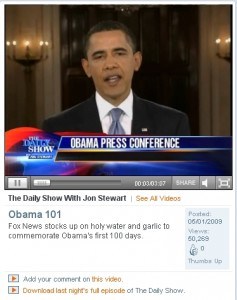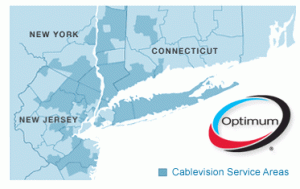We knew it was always come down to the question of what to do about online video. Although the overwhelming majority of broadband customers still take some sort of video package (or simply don’t care enough about television to get one in the first place), there is a small, but growing number of people who are dispensing with video packages from cable and relying entirely on broadband video services to watch network and cable programming.
Hulu and Joost, along with limited fare from the major American networks, as well as video offerings from the CBC and BBC exclusive to residents of those countries, create the potential for a major problem for cable operators — what happens if people stop buying video packages.

Comedy Central's Video Streaming - Will it be available to non-cable subscribers for long?
Comcast and Time Warner, the nation’s largest cable operators, have plans to put a stop to the erosion in video subscribers before it gets serious — by seeing to it that they don’t get to watch free online video any longer.
Comcast’s On Demand Online and Time Warner’s TV Everywhere services are either in operation or will begin trials later this year. Both seek arrangements with cable programmers (coincidentally many of which they also have an ownership interest in) to create a new authentication system to block non-video subscribers from accessing video content aired on those channels. Cable subscribers who do take a video package will get in for free.
The video programming would still exist on various cable network websites. Comedy Central would still have clips on comedycentral.com and CNN would still have their news clips at cnn.com. But under the cable operators’ proposals, those clips would no longer be available to individuals who cannot prove they have a video subscription.
Currently, some 90% of Time Warner’s broadband customers also take a video package, and Time Warner can easily authenticate those subscribers with a type of “authorization key” which an online video player would seek for permission to play the programming. Time Warner is also contemplating whether live streams of cable channels would also be a good idea. Currently, cable operators routinely insist on prohibiting live streaming of the cable networks they carry.
Of course, the problem will come down to those who subscribe via satellite dish services or a smaller cable operator or telephone company video package. Does this enforcement only occur on Time Warner and Comcast’s own broadband networks, or would it be widespread?
Multichannel News covered the Time Warner TV Everywhere trial:
Time Warner Cable is working with two major programming partners on its “TV Everywhere” initiative to make sure the Internet-video service is easy to use and scalable, said Peter Stern, the operator’s executive vice president and chief strategy officer.
Stern, speaking on a panel here at the Cable Show ’09, said the MSO is already working closely with two programmers — Turner Broadcasting System and another he did not identify — that will involve authenticating consumers “in a very straightforward way so they can get access to content.”
“To be honest, we’re still working it out in terms of the user experience,” Stern said.
The concept, which is being Comcast and Cox Communications, is to reinforce the cable TV subscription model, by providing that programming to paying customers over their Internet devices.
Stern pointed out that 90% of Time Warner Cable’s broadband customers are already paying for multichannel video.
“Those people are already entitled to watch this programming,” he said. “The big risk we have is, if we don’t offer this programming to them the way they want it, they’ll turn to piracy.”
Alternatively, if that programming is provided to them for free over the Internet, the risk is they’ll cancel their subscription service – with such “cord cutters” obtaining their media online.
Some basic principles Time Warner Cable is following in developing TV Everywhere are that consumers should “have choice in terms of the sites they can have access on,” he said. “That will be dictated by programmers, not the cable operators.”
Stern continued, “Not to say we’ll not have content on the [Time Warner Cable] RoadRunner site, but we’d be kidding ourselves if we thought we were the only site consumers should be able to access.”
Cable operators have always been concerned about “leakage” of valued cable programming to online streaming or piracy. Cable programming currently charge subscription fees to cable operators for carriage on those systems. Some, like C-SPAN or Current, amount to pennies per month per subscriber. But others, particularly for sports programming, Fox News, basic movie channels, and other high-rated channels command enormous fees amounting to several dollars a subscriber per month each, whether the subscriber wants to watch the programming or not. These costs are continually increasing. Fox News, for example, leveraged very strong price increases for its news channel, as well as forcing a number of cable systems to pick up the low rated Fox Business Channel to receive discounts. Viacom also routinely demands cable operators take additional networks they may not want to carry in return for discounts on the networks those operators do want.
It all gets passed on to cable subscribers in the form of rate increases every year. With the increasing number of channels on a cable lineup, when a bunch demand rate increases, rates can spike significantly from year to year. Nearly all have carriage contracts that forbid the cable operator from selling their network(s) on an a-la-carte basis.
With cable video pricing increasing, many subscribers downgrade their subscriptions to save money. If a cable programming is giving away their content online, that creates a greater incentive for viewers to stop paying for video packages, and rely on their Internet connections instead.
Earlier this week, Time Warner CEO Glenn Britt reiterated that although the erosion of video subscribers isn’t a problem today, it could easily become one tomorrow. He cautioned programmers who give their shows away for free online that a day of reckoning may be coming, when a cable operator is no longer willing to pay for networks that give everything away online.
Rupert Murdoch, chairman of News Corporation, which owns Fox News, supports the concept, according to Multichannel News:
News Corp. chairman Rupert Murdoch said that cable networks have to find a way to monetize the Web, before consumers begin to expect to get their content for free.
“The fact is with free content, people are used to it being free on the Internet,” Murdoch said. “Nobody is making any real money from the Web except search. We have to monetize it.”
The other controversy involves cable operators trying to limit video viewing by imposing usage caps or tiered pricing on consumers, limiting the amount of video they can consume online. At the lower end of the caps proposed by Time Warner, viewing Hulu or Joost programming would be akin to “pay per view,” with fees of 50 cents or more per show in broadband costs, once one’s usage allowance expires.


 Subscribe
Subscribe






Mr. Kim then suggests he doesn’t necessarily like his electricity or water rates, but he conserves because there is a penalty for unrestrained use. Actually, there isn’t really a penalty at all. Gas, electric, and water service are sold on a true metered basis. There are no “bucket plans” for these services. They are also utilities, and their rates are either regulated outright, or carefully monitored in the limited competition models some states have for these services.
Your water company bears the minimal cost of pumping a gallon of water from a body of water or aquifer. It then resells that water at a per gallon rate marked up to cover all of the overhead and expenses it has, sets a little more aside just in case of a non-rainy day, and delivers it to you at a rational, non-gouging price. If you don’t want to pay, you leave the faucet off. On the Internet, the faucet drips… all the time. The only way you are assured of not paying is to unplug your modem, never check your e-mail, and avoid websites with ads, because those are now now on your dime, especially when Time Warner marks up its wholesale cost by 1000% or more for that data. It’s like getting a glass of water but handing half of it to the stranger walking by your house, who also wants you to pay him a dollar on top of that.
Time Warner is also, like many cable providers, hip deep in a conflict of interest on broadband consumption. Cable has a vested interest in forcing you to “conserve” your connection, particularly by not using those services which directly compete with its business models. Streaming video online offers the customer the possibility of foregoing a cable TV package altogether. A Voice Over IP telephone provider on the Internet makes Time Warner’s Digital Phone product redundant. A Netflix set-top box that streams movies and other video programming in competition with premium/pay per view channels represent just one more service that panics many in the upper floors at Time Warner Cable’s headquarters.
Ironically, it was the very same cable companies that are whining about Exafloods and a crisis of costs who have contributed to the demise of “long distance.” Time Warner, among others, are now pitching cheap unlimited calling plans to customers who will never pay for another long distance call. In the wireless industry, price skirmishes have already broken out with carriers marketing true unlimited calling plans or calling circles which, for most people, mean no more airtime minute watching.
When I renew my Verizon Wireless contract this December, I will be handed a new phone and the option of a better plan with more minutes at or below the price I am paying now. By that time, there is every likelihood Time Warner will be asking me to pay three times more ($150 a month) for precisely the same level of service I am receiving now for around $50 a month. One of these companies is responding to the reality that bandwidth costs are declining, and are reducing rates and offering more. The other is taking advantage of a very limited competitive market and wants to triple charges claiming they are on the edge of broadband bankruptcy — only they’re not when you read their financial reports. Guess which is which.
I am also glad you are asking real people these questions, because companies like Time Warner certainly aren’t. Any reader here can recite poll after poll. The overwhelming majority of broadband customers, even those who are not defined “at the moment” as “abusers” of the network are content and satisfied paying one monthly fee for their service. They don’t want your plan, the industry’s plan, buckets, limits, caps, overlimits, or whatever else the marketing people decide to call the equivalent of Internet rationing at top dollar pricing.
We are consumers. We are customers. We are not industry insiders and we don’t write for industry trade publications. We don’t get a paycheck from this industry. Indeed, this industry raises our bill year after year, delivers inconsistent messages about why we are now being asked to pay for “buckets of broadband,” yet still denies us the ability to choose the channels we want for our own video package, paying just for what we want.
We also are empowered and educated enough to use this incredible tool called the Internet to research the assertions some make and simply expect others to accept at face value. We now read financial reports and statements. We verify. We also discover the language of the lobbyist, the marketers, the astroturfers, and the executive elements that are now attempting to sell consumers on their scheme to pay considerably more for the exact same thing, or less. Then we compare that with the glowing results given to shareholders, and we see the chasm between the two messages. We realize what we are being sold: a soon-to-be-even-more-inflated bill of goods.
Frankly, you don’t have to be a genius to recognize that looking at a gas gauge, worrying about overlimit fees, and being stuck paying $100 more a month for broadband is not going to make anyone outside of this industry happy.
The first time a consumer gets a bill from a company with a plan like Time Warner’s, they are going to kick the bucket.
Anyone who doesn’t recognize and admit the real potential of market abusive pricing and policies in a limited competitive marketplace isn’t being completely honest, especially when the players do not offer roughly equivalent levels of service. If the future of broadband in this country is to be unregulated virtual duopolies, then perhaps consumers need to insist on common carrier status for those networks, allowing equal access to a variety of competing providers, with oversight to guarantee fair wholesale pricing and access.